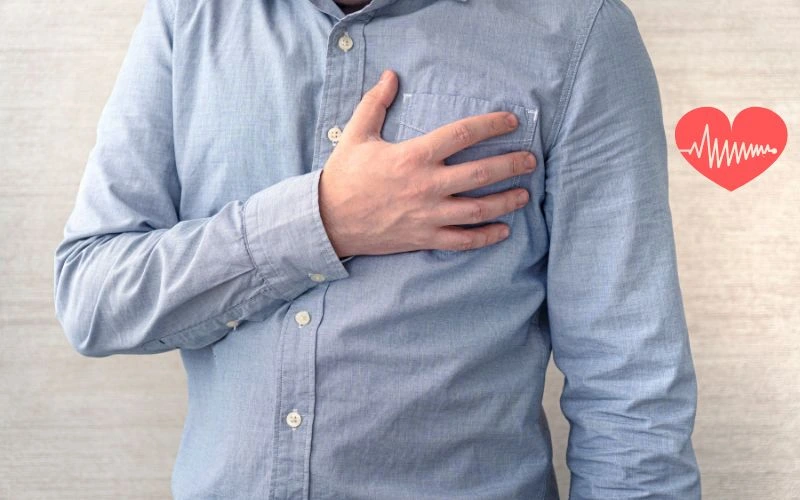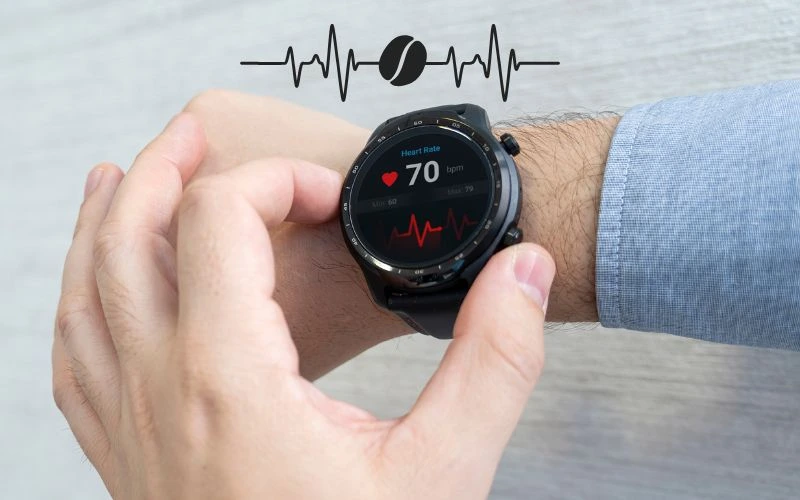Heart palpitations are a common experience that many people encounter at least once in their lifetime. While they often feel alarming, palpitations are usually harmless. Understanding the meaning of palpitations, their causes, and the situations in which medical intervention is necessary can help decode this condition. This article goes in-depth into palpitations meaning, their causes, and when to consult a heart doctor.
What Are Palpitations?
Palpitations refer to an unusual awareness of your heartbeat. They may feel like pounding, fluttering, racing, or even a skipping beat. You can experience these sensations in your chest, throat, or neck, often catching you off guard.
In simple terms, palpitations are the noticeable sensations of your heart beating, often triggered by various factors. While they are usually harmless, they can sometimes signal underlying heart conditions, especially if they occur frequently or come with other symptoms like dizziness or shortness of breath.
Common Symptoms of Palpitations
Palpitations can present themselves in various ways, depending on the individual. People often describe their symptoms as:
- A racing or pounding heartbeat.
- A feeling that the heart is skipping beats.
- A fluttering sensation in the chest.
- Flip-flopping or irregular heart rhythms.
While these symptoms are often benign, it’s crucial to monitor their frequency and duration to identify any potential palpitations reasons that require medical attention.
How Common Are Palpitations?
Palpitations are a widespread occurrence. Studies suggest that nearly 16% of people visit their deneral physician doctor due to palpitations. Furthermore, this is one of the leading reasons for consulting a cardiologist.
Women and people assigned female at birth are more likely to experience palpitations, particularly during hormonal changes such as pregnancy or menopause. However, palpitations can affect anyone, regardless of age or gender.
Palpitations Causes: Exploring the Triggers
Palpitations can occur due to a wide array of factors, ranging from lifestyle habits to medical conditions. Here are some of the most common causes explained by top cardiologist at heart hospital in Delhi:
Emotional Triggers
Emotional factors like stress, anxiety, and panic attacks are among the leading palpitations reasons. These emotions trigger the release of adrenaline, speeding up the heart rate and causing noticeable palpitations.
Lifestyle Habits
Certain lifestyle choices can contribute to palpitations:
- Caffeine and Nicotine: Consuming too much coffee or smoking cigarettes can overstimulate the heart.
- Alcohol and Recreational Drugs: These substances may disrupt the heart’s rhythm, leading to noticeable palpitations.
- Spicy or Rich Foods: Indulging in these foods can occasionally trigger heart palpitations after eating.
Physical Conditions
Physical health also plays a significant role in palpitations causes. These include:
- Pregnancy: A natural increase in blood volume and heart rate during pregnancy can lead to palpitations.
- Anemia and Dehydration: Both conditions can strain the heart, causing unusual heartbeats.
- Overactive Thyroid (Hyperthyroidism): An excess of thyroid hormones can overstimulate the heart.
- Electrolyte Imbalances: Low levels of potassium, oxygen, or blood sugar can disrupt normal heart rhythms.
Medicines for Heart palpitations
Some medications, including asthma inhalers, beta blockers, thyroid medications, and decongestants, may cause heart palpitations as a side effect.
When Do Palpitations Occur?
Palpitations can occur at any time, whether you’re resting or active. Here are some specific scenarios:
Nighttime Palpitations
Palpitations at night are often more noticeable because of the quiet environment, making you acutely aware of your heartbeat. Sleeping on your side or lying flat may also increase the pressure on your chest, triggering these sensations.
Palpitations During Pregnancy
During pregnancy, an increased heart rate is necessary to supply the growing fetus with blood. While these palpitations are usually harmless, consulting a doctor can offer reassurance and guidance.
Persistent Palpitations
If you experience palpitations all day or frequently, it may indicate an underlying condition. This is especially true if they occur with symptoms like dizziness, chest pain, or fainting.
Are Palpitations Dangerous?
In most cases, palpitations are not dangerous. They are often a normal response to external triggers like stress or diet. However, palpitations accompanied by other symptoms, such as chest pain or shortness of breath, could signal a more severe issue, such as an abnormal heart rhythm.
Palpitations But Normal ECG
In some cases, patients with palpitations may undergo an ECG (electrocardiogram), which shows normal results despite ongoing symptoms. This could mean that the palpitations are due to non-cardiac reasons, such as anxiety, dehydration, or dietary factors.
Diagnosing Palpitations
When experiencing frequent or severe palpitations, consulting a specialist is a must. A cardiology hospital in Delhi can provide a thorough evaluation to uncover the root cause.
Steps to Diagnosis
A cardiologist will likely:
- Review your medical history.
- Ask about your symptoms and lifestyle habits.
- Perform a physical examination.
Diagnostic Tests
To pinpoint the cause of palpitations, doctors may recommend:
- Electrocardiogram (ECG): Records the heart’s electrical activity.
- Stress Test: Evaluates the heart’s function under physical exertion.
- Echocardiogram: A detailed ultrasound to assess heart structure and function.
- Holter Monitor: Tracks heart activity over 24 hours or longer.
- Blood Tests: Identifies anemia, thyroid issues, or electrolyte imbalances.
Palpitations Treatment
Treatment for palpitations largely depends on their underlying cause. Many cases require no specific intervention and can be managed with lifestyle changes.
If stress, caffeine, or diet triggers your palpitations, the following steps can help:
- Reduce Stress: Engage in relaxation exercises such as yoga or meditation.
- Limit Caffeine and Alcohol: Cut back on coffee and other stimulants.
- Stay Hydrated: Drink plenty of water to prevent dehydration.

Medical Treatment for heart palpilations
For palpitations caused by heart conditions, cardiologist may recommend:
- Medications to regulate heart rhythm.
- Surgical procedures or implanted devices, such as a pacemaker, for severe cases.
Preventing Palpitations
Prevention is key to reducing the frequency of palpitations. Here are some actionable tips:
- Practice stress management techniques.
- Avoid stimulants like nicotine and excess caffeine.
- Exercise regularly but avoid overexertion.
- Eat a balanced diet to maintain healthy blood sugar and electrolyte levels.
When to See a Doctor?
Although palpitations are often harmless, certain symptoms warrant immediate medical attention. Visit a cardiology hospital if you experience:
- Chest pain or tightness.
- Shortness of breath.
- Dizziness or fainting.
If these symptoms occur frequently or worsen over time, consulting the best cardiologist is essential for proper care.
Heart palpitations, while often harmless, can be unsettling. If your symptoms persist or come with other warning signs, consult a healthcare professional for a comprehensive evaluation.
Kalra hospitals, known for its expertise in cardiology, offers specialized care to diagnose and manage palpitations effectively. By addressing your concerns and providing expert advice, We ensures your heart health is in the best hands.








